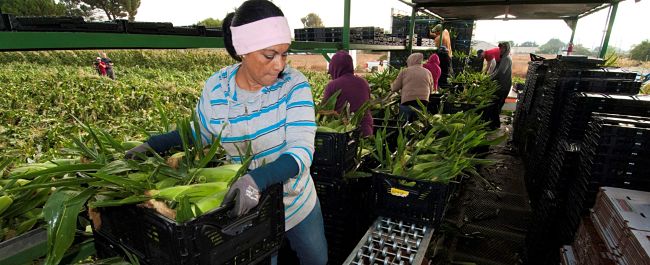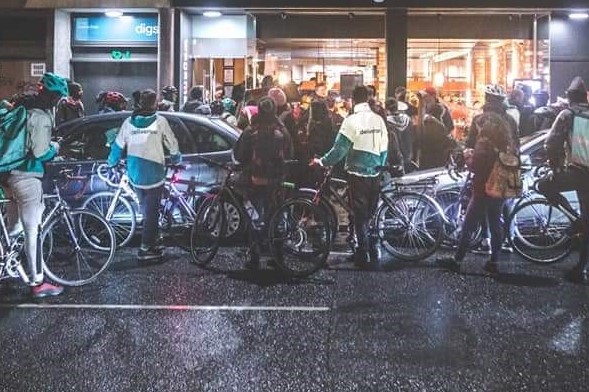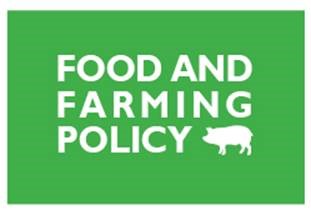Work and workers should be central in the UK national food strategy

The conversations around the future of food, the Agricultural Bill and the UK national food strategy tend to focus exclusively on people as eaters, forgetting the role that women and men have in farming, harvesting, processing, selling, distributing and disposing of food.
About the research
Because of this blind spot, national and local policies do not address important issues such as: the fact that workers in the food system are increasingly food insecure; that a significant proportion of food is produced by workers whose genders, races and migratory status are often the object of discrimination and marginalisation; and that a large portion of the UK population is fed as a result of unpaid labour, such as household labour and the voluntary work in food banks and food charities, that makes the food system fragile and labour not rewarded.
This briefing is the outcome of a meeting held at the University of Bristol Law School on June 14th, 2019 which included academics, union representatives, civil society organisers, and members of food-related NGOs, in the presence of the UN Special Rapporteur on the Right to Food, Professor Hilal Elver.
The perspectives of the experts by experience and the dialogue with academics has led to the conclusion that the UK national food strategy must consider the centrality of labour beyond the idea that the role of the State is to train a skilled workforce that masters new agri-food technologies
We published an open letter aimed at the broad public, with this brief, we want to start a dialogue with policymakers.

Food delivery workers. Photo credit: Thomas Katan
Policy implications
The UK national food strategy must:
• Be based on the recognition of the interconnected nature of all people involved in making food possible: from farm to post-consumption, food-related processes are interdependent.
• Be rooted in the protection, respect and fulfilment of human rights, of both eaters and workers.
• Adopt a broad definition of food workers that includes people who act without a proper status, including carers and volunteers (who are mainly women).
• Recognise that the food system functions increasingly thanks to workers who face multiple challenges because of their gender, race and migratory status. Advocate for representation of workers in policy development, addressing them with coherence and justice.
• Ensure that employers, unions, civil society organisations and other actors involved in the food system are aware of their rights and obligations. This may happen through ‘workers’ rights outreach services’ for marginalized workers, permanent ‘labour rights centres’ established in rural and urban areas, a change in strike laws, and a closer connection with law schools and law clinics around the country.
• Pay attention to the role of recruitment agencies, to better understand the distribution of value between employees and intermediaries and to obtain more accurate data and statistics concerning the workforce in the country.
• Assess and redress the market power of the main food retailers and the way in which it is used over suppliers to obtain cheaper products that often lead to a cut in workers’ protection and labour conditions.
When engaging with the future of work and workers, the UK national food strategy must adopt an integrated approach to who produces food and start from the realisation that there are people operating at every level of the food chain.
Key findings
• There is no food without labour, and because a healthy and justly rewarded workforce is essential to a sustainable food system, we consider that these elements should inform the whole process of the UK food strategy.
• Hunger, obesity and malnutrition are increasingly felt among those who produce and transform food.
• Without the adoption of a broader definition of food workers, no food strategy can truly be integrated and holistic.
• The labour and the workers behind food are often invisible to the wider public and the regulator. This has strong repercussions in terms of health, adequacy of the policies, labour conditions and the fulfilment of the workers’ human rights.
• The lack of an effective access to justice and a reliable enforcement of rights represents one of the main obstacles to the construction of a fair food system that treats workers fairly and according to their needs.
• Technological innovation has been permeating all phases of the food chain: precision farming, drones and hybrid seeds, smart factories, robotized warehouses and the expansion of food delivery apps (gig-economy or platform economy) are transforming conditions of labour from farm to fork. Although technology has the potential to improve the labour conditions by enhancing productivity and reducing labour intensity, it can also lead to higher unemployment, increased dependency of farmers and workers on technology that they do not own, concentration of market power and the uncontrolled harvesting of data by owners of the platforms and the providers of the services.
Policy Briefing 76: Oct 2019
Work and workers should be central in the UK national food strategy (PDF, 527kB)
Contact the Researchers
Tomaso Ferrando
Research Professor, University of Antwerp and Institute of Development Policy (IOB)
Vicki Hird
Campaign Coordinator, Food and Farming Policy, Sustain
Deirdre Woods
Food Actionist and Co-chair of Independent Food Aid Network UK
Further information
Callum Cant, Riding for Deliveroo: Resistance in the New Economy, Polity Press, October 2019
Hilal Elver, Agricultural workers and the right to food (A/73/164), United Nations, Geneva, 2018
Land Workers Alliance et al, A People’s Food Policy: Transforming our Food System, 2018
Related briefings
A UK right to food law could tackle food poverty and environmental degradation
Sustainable fisheries, food security: lessons from tilapia fish in Tanzania
Authors
Dr Tomaso Ferrando, (formerly University of Bristol) - University of Antwerp and Institute of Development Policy
Vicki Hird - Sustain
Deirdre Woods - Independent Food Aid Network

